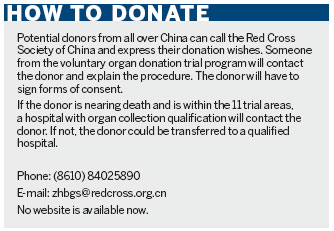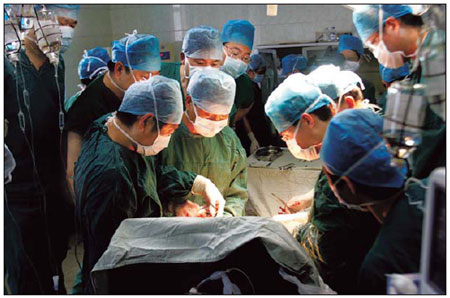Top News
New law targets organ traders
Updated: 2011-02-28 07:43
By Li Li (China Daily)
|
|
How do they work?
Advertisements by so-called organ agents can be found in places ranging from toilet walls in hospitals to the Internet. Type the key words "liver supply" and "kidney source" on Baidu, a popular search engine in China, and you'll see 100,000 hits.
Pretending to be a uremia patient in need of a kidney, a China Daily reporter dialed the phone number of a group that claims to be the biggest organ transplant agent in China and to have had long-term relationships with many organ transplant hospitals in China. The phone number was registered in Linfen, Shanxi province.
"No problem - 200,000 RMB for a kidney," said a Mr. Dong, who promised on the phone to find a suitable donor within a month. "The money includes the donor's surgery, medical care, transportation, accommodation, documentation and agent fee."
When asked how his group could get around the law, Dong snickered. "That's not your concern," he said. "We have a network of people in hospitals and related documentation departments."
Another agency advertised online - with the slogan "saving lives while helping people in need for money" - that heart, liver, kidney, cornea and even newborn babies were all in its "collecting range".
"Free accommodation and meals. We won't charge you anything until after the surgery," said a letter to possible donors posted on its website. "Just think it through and bring your identity card over."
Liver cancer patient Wang Qinglian, 65, had a liver transplant in the General Hospital of Armed Police Forces in Beijing in October. He confessed he would have considered illegal channels for a liver if he failed to get one from the hospital in time.
"To live is the most important concern for a cancer patient," he said.
Lapses in hospitals' identity verification systems allowed the acceptance of fraudulent documents: Strangers could turn into close relatives of patients.
"Once, I overheard the patient asking his alleged cousin, 'What's your name again?'" said lawyer Deng, who also is a doctor who no longer practices medicine.
Some doctors interviewed for this report said they aren't trained to be criminal detectives and are victims themselves as the money-making tools of organ traffickers. Professor Chen is skeptical. "It is more likely that some doctors irresponsibly turn blind eyes to those actions or, worse, they are bribed and take part in the crime."
Stricter rules
The government has identified 163 hospitals as qualified for organ transplants, which makes them the only legal sites for transplant surgery.
There also are specific requirements for live organ donors, published by the Ministry of Health at the end of 2009. The only people who can apply for organ donation are couples who have been married more than three years or who have children, blood relatives of the patient, or foster parents and foster children. Moreover, every organ transplant is subject to approval by a provincial-level medical administrative department.
That department also has to rule on documentation to verify that organ donors are who they say they are - ID proof from the local police station and a letter of consent by a team of doctors from the qualified transplant hospital.
Donor ratio
For every million people, the number of organ donors is 34.38 in Spain, 26.5 in the United States, 17.8 in Europe as a whole, 9 in Taiwan, 5-6 in Hong Kong, and 0.03 on the Chinese mainland, according to the World Heath Organization.
"The voluntary donation ratio, a symbol of social civilization, is disproportional to the country's rapid economic development," said Yang Xusheng, deputy director of the Relief and Health Department under the Red Cross Society of China (RCSC).
Initiated by the RCSC and the country's health ministry, China started a trial program for voluntary organ donations in March 2010. The one-year campaign covers Shanghai, Tianjin, Wuhan, Liaoning, Nanjing, Zhejiang, Shandong, Guangdong, Jiangxi, Hunan and Xiamen.
At the same time, an amendment to the 2007 Regulation on Human Organ Transplantation is being considered for the first time. The proposed amendment would extend the RCSC's responsibility from just encouraging posthumous voluntary organ donations to potential donor registration, organizing memorial services and operating an incentive plan. That plan would give some financial support, such as a deduction or waiver of medical fee, because each potential donor would be under medical care.
"It will give legal footing to the Red Cross Society of China to set up and run China's organ donation system," Huang Jiefu, vice-minister of health, told China Daily in January.
Before the trial project, posthumous voluntary organ donations were directly carried out by the hospitals themselves. "It was inappropriate to have organ transplant doctors speak of organ donation to families of a dying patient," said Chen, the professor. "The interest conflict immediately creates distrust."
On the other hand, RCSC, a nonprofit organization, has a natural advantage in such matters.
"RCSC has established a credible image among the public, especially after our good performances during the recent natural disasters such as the Wenchuan and Yushu earthquakes and Zhouqu mud-rock flow," relief director Yang said.
A national organ donation system would connect patients in intensive care units of hospitals certified to handle donations with patients in organ transplant units of recipient hospitals. And it would find those who want to donate organs but don't know how.
The late novelist and screenwriter Shi Tiesheng almost missed the chance to realize his wish of donating his liver when he died in December in Beijing because of kidney failure. In the last minutes of his life, he was transferred with a life-support machine from Xuanwu Hospital to the General Hospital of Armed Police Forces while a group of Red Cross coordinators rushed to Beijing from Tianjin. Xuanwu was not qualified for organ collection
"The whole process could have gone unperturbed and smoother if a donation procedure supported by a good donation system was ready," said Feng Aiguo, an experienced coordinator from the Red Cross in Tianjin, who took part in Shi's memorial party in Beijing in January.
Tough conversation

A critical link in the process is the coordinator, who speaks to a potential donor's relatives, often after an accident. "It is extremely difficult," Feng said. "Their families are easily agitated when hearing 'organ donation', especially under the extreme emotion of the sudden loss of a beloved family member."
After months of practice, Feng and his colleagues summarized the most helpful expression. "What we said the most is that by organ donation, not only does he or she save other people's lives but it also is a way of extending that person's life in another person's body."
Lack of support from direct, close relatives, called lineal relatives, usually bogs things down because their unified consent is required, even if the donor had earlier given signed consent to organ donation.
"I'm worried if I can fulfill my wish of organ donation or not," said Jin Weihua, 65, a retired construction manager from Hebei province.
Jin has decided to donate his organs for patients in need. Everyone supports Jin's decision except his son. "I want to be able to make my own decisions about my body," Jin said.
Deng, the medical association's legal expert, pointed out that the fundamental obstacle comes from the tradition of intact remains.
"Most Chinese believe that his or her body is an inheritance from parents, which they are not allowed to break apart. Scientific education is needed to help them abandon those outdated thoughts."
So far, the voluntary donation trial has generated more than 30 donors and more than 80 successful donations. Representatives from Red Cross, public health and hospitals from all 11 trial regions will participate in a summary meeting March 9-11 to share their experiences.
Specials

Kremlin buddies
Dmitry Medvedev and Vladimir Putin inspect Olympic preparations.

Lantern Festival
The Lantern Festival is celebrated across China.

New York Fashion Week
Models line up before a show during New York Fashion Week.
